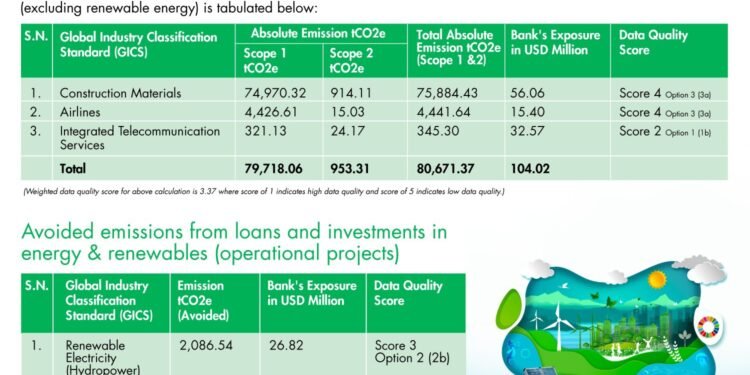KATHMANDU: Nabil Bank has disclosed its greenhouse gas (GHG) emission report of the year 2022 from the bank’s loan and investments portfolio under the Infrastructure and Project Financing (IPF) division.
The report has been made public as a part of a commitment letter signed by Nabil Bank as one of the Partnership for Carbon Accounting Financials (PCAF) signatories in 2021.
The IPF portfolio includes a range of investments and loans to business sectors like energy, cement, airlines, telecommunication services, and others. The Sustainable Banking vertical of the bank had set out to measure emissions from the bank’s loan and investments portfolio under the IPF division.
As per the assessment of the portfolio’s carbon emission revealed that the total emissions for the year 2022 amounted to 80,671.37 tonnes of carbon-dioxide equivalent. Simultaneously, investment on hydro and solar comprises carbon-dioxide emissions avoided by 2131.81 tonnes.
“While this is a significant amount, we are actively working to reduce our carbon footprint and make our portfolio more sustainable,” said Gyanendra Prasad Dhungana, Chief Executive Officer of Nabil Bank.
Meanwhile, Nabil Bank is dedicated to building a sustainable future, he added, “We recognize that this requires collective action. We believe that transparency is essential in achieving our goals, as we are committed to providing regular updates on our progress towards a net-zero carbon footprint.”
Nabil Bank, being the first private sector bank in Nepal, has pioneered in financial service innovations and sustainability in the banking industry. The sustainable banking unit set up by the bank is an approach to a new banking culture altogether and comes out of its desire to do responsible banking.
According to the bank, it chooses to be more sustainable in all its actions, be it in its own operations and resource management, overall business activities including its CSR initiatives. Moreover, the bank encourages its staff to sustainable practices in daily life, both inside and outside the office, and shall gradually de-carbonize its own operations through clean energy sources.





















